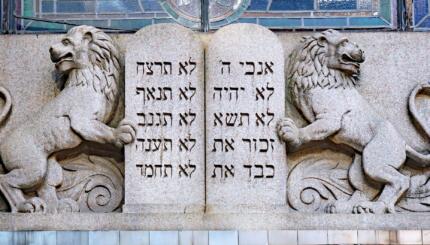After dealing with much internecine strife, the Jewish leader, surrounded by Roman troops, surrenders to the Roman general, predicts that the general will be named emperor, and is treated with remarkable clemency.
If the story is familiar, it most likely reminds the reader of the first century CE escape of Rabban Yohanan ben Zakkai from Jerusalem, retold in several different versions. Yet the description also applies to historian, soldier, and political figure Josephus Flavius’ first century CE description of his own surrender to the Romans in Jotapata. The selections below from Josephus’ history, the Jewish War, and from one talmudic account of Rabban Yohanan’s escape are excerpted from the longer accounts, with an eye towards highlighting the similarities between the tellings.
The Siege of Jotapata
After conquering the town of Gabara, Vespasian turned his attention to Jotapata which, Josephus writes, the general believed was a significant enemy stronghold. While Vespasian laid siege to the town, Josephus sneaked in and rallied the people to defend themselves. Nevertheless, it was clear to Josephus that the town would eventually fall. At this point, Josephus tried to convince the townspeople that he should escape:
"Josephus, hiding his concerns for his own safety, said that he was trying to leave in order to help [the townspeople]. By staying he could provide little help. If they were captured, what help would it be for him to die with them. If he were outside, he could put together an army from the whole Galilee to divert the Romans from the siege" (JW 3.197-199).
With your help, My Jewish Learning can provide endless opportunities for learning, connection and discovery.
The people were not swayed and insisted that Josephus stay.
"So Josephus decided to stay, so he turned their despair into a weapon and exclaimed, ‘Now is the time to begin the fight, when there is no hope of deliverance, for it is glorious to give one’s life to win renown, and to make oneself remembered through some great deed’" (JW 3.204).
Josephus led the townspeople in a valiant defense of the city, but, as Josephus later claimed he had predicted, the town fell on the 47th day. The Romans searched for Josephus,
"but while the city was being captured, Josephus, aided by some divine providence, had escaped from amidst the enemy and jumped into a deep pit…where he found forty persons of distinction hidden with supplies that would last for several days."
In the cave, Josephus "remembered the dreams by which God had forewarned him of the impending fate of the Jews and the destinies of the Roman emperors" (JW 3:351). As he considered surrendering, the other people in the cave shouted at him:
"’Are you so in love with life, Josephus, that you can bear to live as a slave?…We will lend you a sword and a hand. If you die willingly, you will die as the general of the Jews; if you die unwillingly, you will die as a traitor.’ As they said this, they pointed their swords at him and threatened to kill him if he surrendered to the Romans" (JW 3.357-360).
Josephus argued against suicide, but to no avail, but ultimately convinced the people to draw lots to kill each other. "However, Josephus, shall we say by luck or by divine providence, was left with one other man" (JW 3.391) whom he convinced to join him in surrendering to the Romans. Josephus is brought to Vespasian, and says:
"You believe, Vespasian, that I am merely a prisoner, but I come to you as a herald of greater destinies. …You will be Caesar, Vespasian. You will be emperor, and your son here" (JW 3:400-401).
Josephus remained in custody until the events of 69 C.E. proved his prophecy correct.
Yohanan ben Zakkai’s Escape
The story exists in several versions; this version comes from the Talmud, Gittin 56a-b.
"The biryonim (revolutionaries) were then in the city. The rabbis said to them, ‘Let us make peace with [the Romans]. They would not let them. They said, ‘Let us fight them. The rabbis said: That will do nothing. [The biryonim] went and burned the stores of wheat and barley creating famine…."
"Abba Sikra, the head of the biryonim in Jerusalem, was Rabban Yohanan b. Zakkai’s nephew. [Yohanan] sent to [Abba Sikra] saying, ‘Come to me secretly.’ When he came he said, ‘How long are you going to continue killing everyone with starvation?’ He replied, ‘What should I do? If I say anything to [the other biryonim], they’ll kill me.’ "
"Yohanan said, ‘Fix it so I can leave. Maybe I’ll be able to save a little.’ Abba Sikra said to him, ‘Pretend to be sick, let people know and ask about you. Then put something rotten next to you so they’ll think you are dead. Then let your students carry you out–no one else, lest they realize you’re too light.’ They did this; R. Eliezer carried one side [of the bier] and R. Joshua the other."
"When they reached the gates, they wanted to pierce [the body.] He said to them, ‘They’ll say you stabbed our teacher.’ They wanted to hit [the body]. ‘They’ll say you hit our teacher.’ They opened the gate, and [Yohanan] got out."
Although some imagine these "gatekeepers" to be Roman guards enforcing the siege, the narrative indicates that Yohanan needed to deceive the biryonim, not the Romans. Roman guards would not have been impressed by an argument like "they’ll say you stabbed our teacher" but Jewish biryonim trying to prevent desertion might have been.
"When Yohanan [got to Vespasian], he said, ‘Peace on you, O king, peace on you, O king. [Vespasian] said, ‘You deserve two death verdicts, one since I am not king, and once, because if I am king, why have you only come now?’ Yohanan answered, ‘You are truly a king, for Jerusalem will only be conquered by a king…"
"At that moment, a messenger came from Rome saying, ‘Rise, for Caesar is dead, and those who matter in Rome have decided to make you emperor’….Vespasian said, ‘I am now going, and I will send a replacement. But ask from something that I can give you.’ Yohanan said to him, ‘Give me Yavneh and its sages…’"
Jewish tradition sees this as the foundation of the rabbinic movement in Yavneh, a resurrection of Judaism outside the dying city of Jerusalem.
Comparing the Stories
Many have associated these two stories because of the prediction of Vespasian’s ascent to the emperorship, but the other common elements are just as striking. Each expresses a profound sense of hopelessness; the revolt has no chance of succeeding against the overwhelming power of Rome, although escape might allow for some degree of help.
In both stories, hopelessness leads to self-destructiveness. The people in the cave at Jotapata were set on suicide, and the rabbinic story describes the revolutionaries in Jerusalem burning the food. In both stories, despair is used to manipulate or motivate the people into fighting the Romans.
The revolutionaries are presented as intolerant of any dissent. The people in the cave would kill Josephus, and Abba Sikra confesses to Rabban Yohanan that the other biryonim would kill him. In order to escape, Josephus asserts that his drawing the last lot was due to "luck or divine providence;" any reader, ancient or modern would not hesitate to add the third, most probable explanation: trickery. Similarly, Rabban Yohanan’s escape required him to trick the guards at the gates.
Historians who have tried to identify the history in the two accounts may have asked the wrong question. The similarity of the two narratives teaches more about memory than about history.
Both stories were written after Rome’s destruction of the Temple, and the authors of each story made a clear point about accepting and living with that new reality. The stories attest to the fact that the revolutionaries were deceived, not only by Josephus and Yohanan in their respective escapes, but in their perception that they could throw off Rome.
Both saw the loss of Jewish independence as a tragedy, and both sought, in Yohanan’s words "to save a little." Josephus lived in Rome under imperial patronage, and Yohanan lived in the former imperial estate of Yavneh; accommodation to Rome allowed each to create a legacy for later generations.


